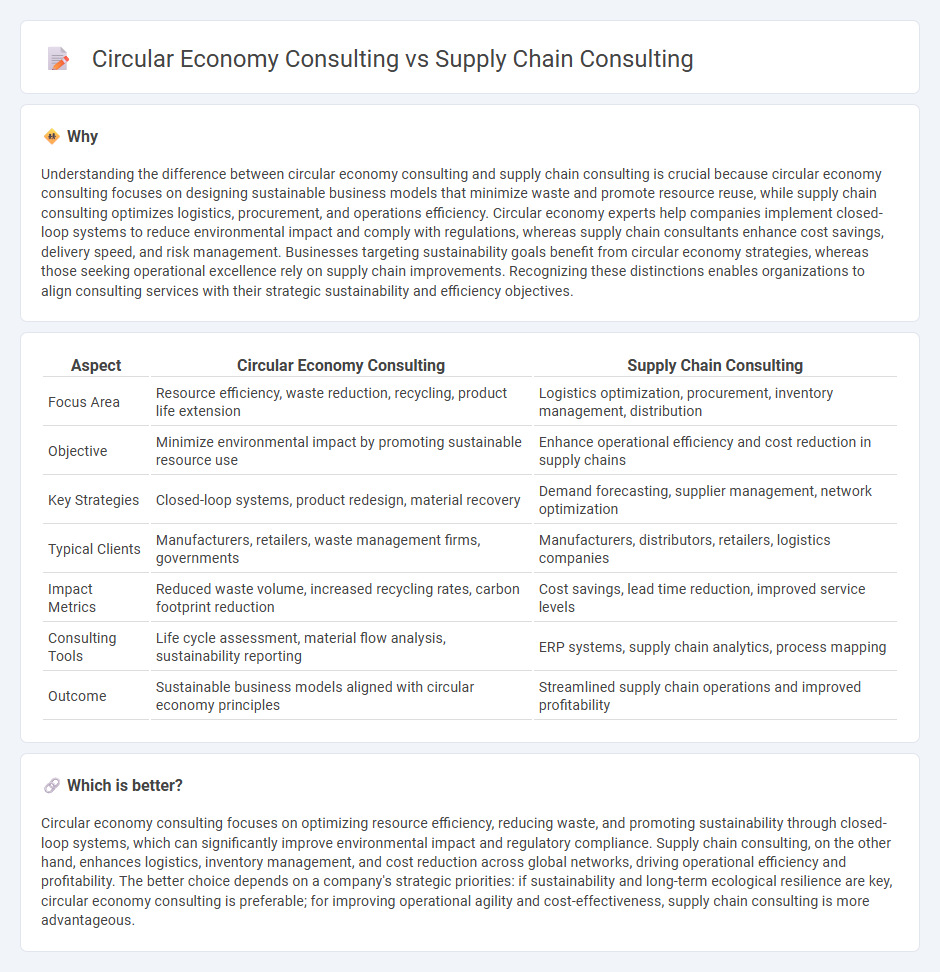
Circular economy consulting focuses on redesigning business models to maximize resource efficiency, reduce waste, and promote sustainable product lifecycles, while supply chain consulting optimizes the flow of goods, information, and finances from raw material sourcing to end customer delivery. Both areas leverage data analytics, process improvement, and strategic planning but differ in their primary goals: circular economy consulting emphasizes sustainability and environmental impact, whereas supply chain consulting centers on cost reduction and operational efficiency. Explore how each consulting specialty can transform your business and drive competitive advantage.
Why it is important
Understanding the difference between circular economy consulting and supply chain consulting is crucial because circular economy consulting focuses on designing sustainable business models that minimize waste and promote resource reuse, while supply chain consulting optimizes logistics, procurement, and operations efficiency. Circular economy experts help companies implement closed-loop systems to reduce environmental impact and comply with regulations, whereas supply chain consultants enhance cost savings, delivery speed, and risk management. Businesses targeting sustainability goals benefit from circular economy strategies, whereas those seeking operational excellence rely on supply chain improvements. Recognizing these distinctions enables organizations to align consulting services with their strategic sustainability and efficiency objectives.
Comparison Table
| Aspect | Circular Economy Consulting | Supply Chain Consulting |
|---|---|---|
| Focus Area | Resource efficiency, waste reduction, recycling, product life extension | Logistics optimization, procurement, inventory management, distribution |
| Objective | Minimize environmental impact by promoting sustainable resource use | Enhance operational efficiency and cost reduction in supply chains |
| Key Strategies | Closed-loop systems, product redesign, material recovery | Demand forecasting, supplier management, network optimization |
| Typical Clients | Manufacturers, retailers, waste management firms, governments | Manufacturers, distributors, retailers, logistics companies |
| Impact Metrics | Reduced waste volume, increased recycling rates, carbon footprint reduction | Cost savings, lead time reduction, improved service levels |
| Consulting Tools | Life cycle assessment, material flow analysis, sustainability reporting | ERP systems, supply chain analytics, process mapping |
| Outcome | Sustainable business models aligned with circular economy principles | Streamlined supply chain operations and improved profitability |
Which is better?
Circular economy consulting focuses on optimizing resource efficiency, reducing waste, and promoting sustainability through closed-loop systems, which can significantly improve environmental impact and regulatory compliance. Supply chain consulting, on the other hand, enhances logistics, inventory management, and cost reduction across global networks, driving operational efficiency and profitability. The better choice depends on a company's strategic priorities: if sustainability and long-term ecological resilience are key, circular economy consulting is preferable; for improving operational agility and cost-effectiveness, supply chain consulting is more advantageous.
Connection
Circular economy consulting and supply chain consulting intersect through the optimization of resource efficiency and waste reduction across supply networks. By integrating circular economy principles, supply chain consulting enhances sustainability by redesigning procurement, production, and logistics to minimize environmental impact. This synergy enables businesses to achieve cost savings, regulatory compliance, and long-term resilience through closed-loop supply chains.
Key Terms
**Supply Chain Consulting:**
Supply chain consulting centers on optimizing processes such as procurement, logistics, inventory management, and demand forecasting to enhance efficiency and reduce operational costs. Consultants leverage data analytics, technology integration, and risk management strategies to create resilient and agile supply chains. Explore how supply chain consulting drives business growth and competitive advantage.
Logistics Optimization
Supply chain consulting emphasizes enhancing logistics optimization through streamlining transportation routes, implementing advanced inventory management systems, and reducing operational costs to boost overall efficiency. Circular economy consulting focuses on redesigning logistics to support resource recovery, waste reduction, and closed-loop systems that promote sustainability and minimize environmental impact. Explore the benefits of integrating circular economy principles into supply chain logistics to drive both economic and ecological value.
Supplier Management
Supply chain consulting prioritizes supplier management through optimizing procurement processes, enhancing supplier performance, and reducing costs by leveraging data analytics and technology integration. Circular economy consulting emphasizes supplier collaboration for sustainable sourcing, waste minimization, and resource efficiency to promote closed-loop production cycles. Explore how these consulting approaches reshape supplier management strategies for resilient and eco-friendly operations.
Source and External Links
Supply Chain Strategy, Planning and Operations Consulting - Gartner - Supply chain consulting includes strategic advisory services focused on risk analysis, innovation, digital and regulatory challenges, and operations consulting that improves efficiency through process reengineering and optimization aligned with business strategy.
Supply Chain Consulting Services | Kepler U.S - Kepler offers supply chain consulting in logistics network design, planning and scheduling, warehouse management, and inventory management to help organizations build robust, resilient, and cost-effective supply chains.
Top Supply Chain consulting firms in the US - Leading US supply chain consulting firms include Maine Pointe, GEP, Kearney, Accenture, Bain & Company, Deloitte, and EY, known for their advisory and implementation expertise in improving supply chain capabilities.
 dowidth.com
dowidth.com